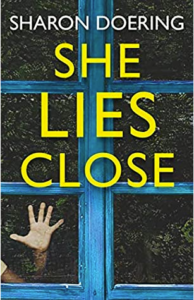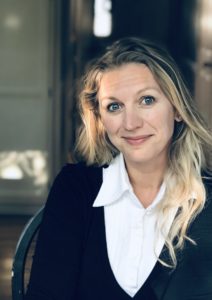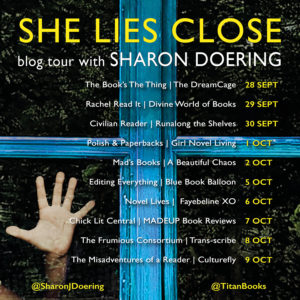Q. Every book has its own story about how it came to be conceived and written as it did. How did She Lies Close evolve?
 The inspiration for She Lies Close came from my family’s move to a new neighborhood years ago and finding out that a guy down the street was being prosecuted for a child crime. Within months he was convicted, sold his house, and went to prison. While it was creepy (and I wouldn’t let my little boys play near his house), I never felt desperate. I had a good support system in my husband.
The inspiration for She Lies Close came from my family’s move to a new neighborhood years ago and finding out that a guy down the street was being prosecuted for a child crime. Within months he was convicted, sold his house, and went to prison. While it was creepy (and I wouldn’t let my little boys play near his house), I never felt desperate. I had a good support system in my husband.
It got me thinking though…What if you moved right next door to a dangerous man, a suspect in a child kidnapping (maybe murder), and what if you had no support system, no sounding board? What if you were recently divorced and financially strapped? What if you had secrets of your own and mental health issues complicating your life? What if your sinister neighbor started talking to your little girl, giving her gifts?
I took the premise of a dangerous next-door neighbor and added a big old bag of What Ifs. I wanted to write a psychological thriller that was dark, desperate, and also funny. I wanted to write a thriller where the characters were stretched too far, where we get to witness some of them snap.
Q. As a mom who is the temperamental opposite of Grace Wright, the narrator of She Lies Close, I felt little empathy but a lot of sympathy for her. The demands of modern motherhood are so high, and can fracture stronger psyches than Grace’s, especially when coupled with the fragile social support systems America is notorious for. How does your own experience with motherhood inform your writing, particularly here with Grace?
What a beautifully worded question!
Some of the feelings Grace has all the time, I have experienced briefly. Most of us have. Anxiety. Deep love. Rage at the world. Anger at the kids. Fear of being caught as incompetent. Irritation with our partner. Shame. So much in here is honest. But the story and characters are invented.
I have felt some of Grace’s anxieties, but on a small, manageable scale. I am pretty laid back.
I have several women in my life who are juggling too much on their own. They have primary custody of their kids, they are working full time, struggling with finances, managing a home, doing the cooking, the cleaning. I am doing only half of what they are doing, and sometimes my workload feels overwhelming. I don’t know how these women do it. I think about this a lot.
I wonder how many of us who are feeling stable—emotionally, mentally, physically, and financially—are just two or three catastrophes away from going off the deep end. I wanted to explore that.
Being a mother was most helpful in the manifestation of the children’s characters in She Lies Close. Children are fascinating and complex, and I wanted to write a novel where we get to see their pure hearts, their evil genius, their intelligence, and their mindlessness. In writing She Lies Close, I didn’t use anything my kids have said, but having kids made writing their dialogue feel natural.
Q. Grace is a bold choice for a sleuth: overwhelmed, with poor impulse control and a tendency to make bad decisions. I kept wanting to yell at her to embrace both sleep and therapy. What inspired you to so fearlessly depict Grace’s mental and emotional unraveling as she insinuates herself into the case of 5 year-old Ava Boone’s disappearance?
The story was Grace’s from the start. Once I had the idea for the book, Grace’s voice came on pretty strong. I wanted to explore her struggle, but also wanted her to be a bit shocking. I want editors to not be able to look away, so I kept adding complications to stretch her.
Q. Do you write with any particular audience in mind? Are there any particular audiences you hope will connect with this story?
I wrote this story in a bubble. I wasn’t on Instagram, I wasn’t on Twitter, I wasn’t talking to other writers. I was just working, taking care of my family, reading books I randomly pulled off library shelves, and writing because I love it. I wrote this with no audience in mind. I guess I wrote it for readers like me who love a voicey character, who love raw and shocking characters, who enjoy a bit of everything in their thriller – controversy, violence, suspense, sex, intellect, chaos. I know there are readers like me out there—I hope it will connect with them!
But it’s an interesting question because I am writing/editing my second novel now and I am much more aware of my audience and their expectations of twists, beginnings, and endings.
I loved writing this first novel in a bubble. I am loving writing this second novel with the curtain pulled back and being aware of the reading/writing community and what they expect. Ultimately, you have to tell the story you want to tell. Grab any book off the shelf, and there are readers who adore it and readers who hate it. Books are funny that way.
Q. Your website describes your journey to writing and publishing as being slow and meandering, starting at a biotech job where you discovered you enjoyed writing quarterly reports before deciding to turn your hand to fiction. This was followed by nearly twenty years and several novels before landing a contract for your debut She Lies Close. What advice have you gleaned from your own experience that you think aspiring published authors might want to keep in mind?
 Stubbornness is your friend. Expect rejection. Most of us need to write a lot of mediocre words before we figure out what works for us. Nothing you wrote is a waste. All those words that no one will ever see, they were part of the process.
Stubbornness is your friend. Expect rejection. Most of us need to write a lot of mediocre words before we figure out what works for us. Nothing you wrote is a waste. All those words that no one will ever see, they were part of the process.
Write with the intent to publish, but that can’t be the end goal because there is too much you cannot control. If writing makes you happy, carve out time for it.
If you are having trouble with procrastination, The War of Art by Steven Pressfield is a brilliant guide. I’m reading it now.
Walks and baths are good for thinking!
Q. What is the first book you read that made you think, “I have got to write something like this someday!”
The first book I loved was The Tommyknockers by Stephen King. I read it at age 15, but at that age I didn’t know I could be a writer. I wasn’t incredibly pragmatic or anything; it just never crossed my mind as a possibility. I read Dennis Lehane’s first book, A Drink Before the War, around the time writing was forming as a possibility in my mind. I have a poor memory, but I think when I read that book, I was thinking, Oh, man, if only I could write something this good. Any book Megan Abbott or Gillian Flynn have written, I’ve thought, I wish I wrote this!
Q. Do you adhere to any particular writing regimen?
I would love to have a regimen! Like so many people who have kids doing e-learning at home, I am going a little nuts with the lack of routine and quiet time.
I have been writing in short, thirty-minute bursts while wearing noise-cancelling headphones designed for power-tool work. It is not ideal, and my ears hurt.
If I can hide in the car in the garage for two hours while the kids are watching TV/playing video games, I am usually productive enough. The key is non-interrupted time.
My ideal writing routine would be to write from 1 to 6 every day. That has never happened.
I rely heavily on caffeine. 1-2 cups of tea, then 2-4 cups of coffee, and I round it out with 1 coke zero.
Q. Are you a pantser (someone who writes by the seat of their pants) or a plotter?
Pantser!
Q. I loved the anecdote about how you came to writing psychological thrillers after trying your hand at various other genres and subgenres. The editor you spoke with was certainly on to something when they suggested you write what you were reading! Any plans to revisit those other fields, or do you think you’ll stick with what you’ve shown you’re really good at?
Oh, I am fond of my tech thrillers! I can see myself doing another one at some point. No more PI novels or romance for me. I don’t think I have anything interesting to add to those genres. I am terrible at writing romance; I have this urge to add absurdity. Horror is difficult to pull off, but I’m open to it. I am open to lots of things, but I love writing psychological thrillers. It’s my favorite thing to read. I’m going to stick with this genre for now.
Q. What can you tell us about your next project?
I am deep in edits right now with another stand-alone psychological thriller. It will be out in 2021!
Q. What are you reading at the moment?
Jane Doe by Victoria Helen Stone and the War of Art by Steven Pressfield
Q. Are there any new books or authors in the mystery/thriller genre that have you excited?
I am looking forward to the debut thrillers of Allie Reynolds (Shiver), May Cobb (The Hunting Wives), Halley Sutton (The Lady Upstairs), and Eliza Jane Brazier (If I Disappear). Honestly, I am excited to read any new book coming out.
My next read is Rachel Howzell Hall’s And Now She’s Gone, and I’m looking forward to John Hart’s new book, The Unwilling.
Q. Tell us why you love your book!
Thanks for asking! I love the dark humor in She Lies Close. I love my chapter titles. I am of a fan of my sex scenes. I love the intellectual questions this psychological thriller explores regarding hypervigilance, parenting, our obsession with media, and drug/environmental effects on neuroscience. I love the raw writing—I worked hard to dig into Grace’s head and expose her.
Author Links
~~~~~~~
She Lies Close is out in the UK as of September 8th, 2020 and is available States-side for pre-order ahead of its US publication date on November 10th, 2020 from all good booksellers. In the meantime, check out the other stops on the Titan Books blog tour!

